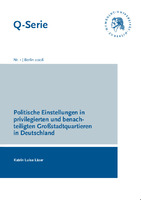Politische Einstellungen in privilegierten und benachteiligten Großstadtquartieren in Deutschland
| dc.contributor.author | Läzer, Katrin Luise | |
| dc.date.accessioned | 2011-08-18 00:00:00 | |
| dc.date.accessioned | 2020-04-01T15:21:36Z | |
| dc.date.available | 2020-04-01T15:21:36Z | |
| dc.date.issued | 2008 | |
| dc.identifier | 391372 | |
| dc.identifier | OCN: 808385432 | en_US |
| dc.identifier.uri | http://library.oapen.org/handle/20.500.12657/34624 | |
| dc.description.abstract | In the course of structural change from an industrial society to a service society large cities in Germany and Europe undergo a profound economic, social and political process of change, which leads to a sharper segregation in the cities. The social spatial concentration of unemployment, poverty and social exclusion in underprivileged city areas removes such areas in their social standards and life chances far from the urban life of the majority. This raises the question of urban social and political integration. The doctoral thesis is dedicated to one aspect of the question regarding integration of cities. It focuses on the political perceptions and attitudes of their citizens. A noticeable declining of turnouts of voters and an increasing “disenchantment with politics”, which signal the disappointment and resignation of disadvantaged groups toward policy, and a tendency towards desolidarization in privileged areas give reason to analyze political attitudes in cities. Therefore, the doctoral thesis deals with local political attitudes in privileged and underprivileged city areas in four cities: Berlin, Cologne, Leipzig and Mannheim. Political attitudes are operationalized as political trust, the perception of responsivity of local policy, political participation as well as solidarity, social confidence and social commitment. A telephone poll was carried out with 400 standardized interviews in each of four privileged and four underprivileged quarters. In total, 3200 interviews were conducted and included in the statistical analysis. | |
| dc.language | German | |
| dc.relation.ispartofseries | Q-Serie | |
| dc.subject.classification | thema EDItEUR::J Society and Social Sciences::JB Society and culture: general::JBF Social and ethical issues | en_US |
| dc.subject.classification | thema EDItEUR::J Society and Social Sciences::JH Sociology and anthropology::JHB Sociology | en_US |
| dc.subject.classification | thema EDItEUR::J Society and Social Sciences::JP Politics and government | en_US |
| dc.subject.other | politische einstellungen | |
| dc.subject.other | stadtsoziologie | |
| dc.subject.other | vertrauen | |
| dc.subject.other | solidarität | |
| dc.subject.other | local government | |
| dc.subject.other | political attitudes | |
| dc.subject.other | urban sociology | |
| dc.subject.other | stadtpolitik | |
| dc.subject.other | trust | |
| dc.subject.other | soziales kapital | |
| dc.subject.other | solidarity | |
| dc.subject.other | soziale ungleichheit | |
| dc.subject.other | social inequality | |
| dc.subject.other | social capital | |
| dc.subject.other | Berlin | |
| dc.subject.other | Köln | |
| dc.subject.other | Kommunalpolitik | |
| dc.subject.other | Leipzig | |
| dc.subject.other | Mannheim | |
| dc.subject.other | Pierre Bourdieu | |
| dc.title | Politische Einstellungen in privilegierten und benachteiligten Großstadtquartieren in Deutschland | |
| dc.type | book | |
| oapen.abstract.otherlanguage | Großstädte in Deutschland und Europa befinden sich im Zuge des Strukturwandels von der Industriegesellschaft zur Dienstleistungsgesellschaft in einem tiefgreifenden ökonomischen, sozialen und politischen Wandlungsprozess, der zu einer schärferen Segregation der Städte führt. Die sozialräumliche Konzentration von Arbeitslosigkeit, Armut und sozialer Ausgrenzung in benachteiligten Großstadtgebieten entfernt solche Stadtgebiete in ihren sozialen Standards und Lebenschancen immer weiter vom urbanen Leben der Mehrheit. Dies wirft die Frage nach der sozialen und politischen Integration der Städte auf. Die vorliegende Arbeit widmet sich einem Teilaspekt der Frage nach der Integration in den Städten und fokussiert die Wahrnehmungen und Einstellungen ihrer Bürgerinnen und Bürger. Anlass dazu geben rückläufige Wahlbeteiligungen und eine zunehmende „Politikverdrossenheit“ in benachteiligten Stadträumen, die die Enttäuschung und Resignation benachteiligter Gruppen gegenüber der Politik signalisieren, sowie Entsolidarisierungstendenzen in privilegierten Gebieten. Die Arbeit beschäftigt sich mit den lokalen politischen Einstellungen und vergleicht diese in sozialstrukturell benachteiligten und privilegierten Stadtquartieren in vier Großstädten: Berlin, Köln, Leipzig und Mannheim. Unter politischen Einstellungen werden das lokale politische Vertrauen, die Wahrnehmung der lokalen Politik und die politische Partizipation sowie die Solidaritätsbereitschaft, das soziale Vertrauen und das bürgerschaftliche Engagement verstanden. Insgesamt wurden 3200, d.h. in jedem untersuchten Stadtgebiet 400 standardisierte Telefoninterviews durchgeführt und statistisch ausgewertet. | |
| oapen.identifier.doi | 10.26530/OAPEN_391372 | |
| oapen.relation.isPublishedBy | 0a2f328b-4fd0-48ed-b7f0-26bf849f0869 | |
| oapen.series.number | 1 | |
| oapen.pages | 235 | |
| oapen.remark.public | Relevant Wikipedia pages: Berlin - https://de.wikipedia.org/wiki/Berlin; Köln - https://de.wikipedia.org/wiki/K%C3%B6ln; Kommunalpolitik - https://de.wikipedia.org/wiki/Kommunalpolitik; Leipzig - https://de.wikipedia.org/wiki/Leipzig; Mannheim - https://de.wikipedia.org/wiki/Mannheim; Pierre Bourdieu - https://de.wikipedia.org/wiki/Pierre_Bourdieu; Soziales Kapital - https://de.wikipedia.org/wiki/Soziales_Kapital; Sozialstruktur - https://de.wikipedia.org/wiki/Sozialstruktur | |
| oapen.identifier.ocn | 808385432 |

